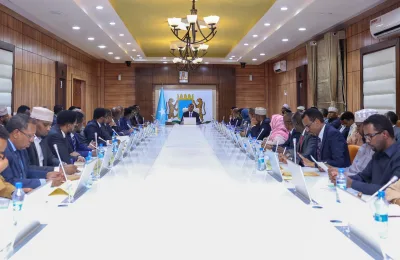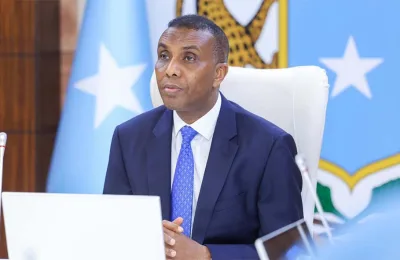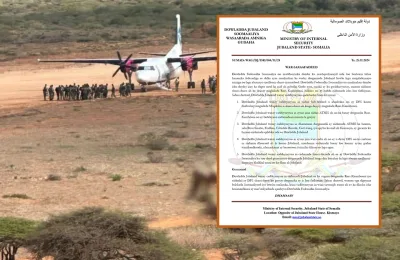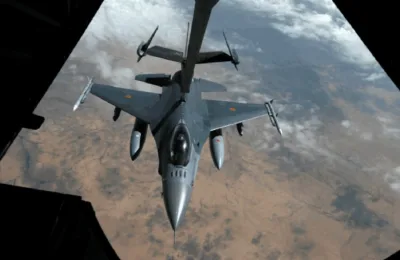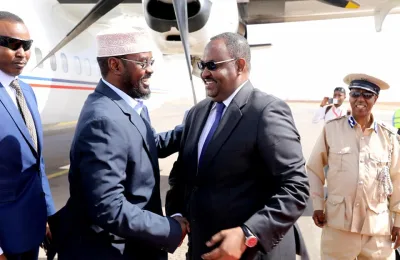On the 10th anniversary of its attempted invasion and occupation of Somalia in 2006, Ethiopia has…

On the 10th anniversary of its attempted invasion and occupation of Somalia in 2006, Ethiopia has moved to directly and openly dictate who should be elected the next President of Somalia. The Centre for Dialogue, Research, and Cooperation (CDRC), an Ethiopia-based organisation, published what it called an analysis of the political and security situation in Somalia in the context of the current elections in Somalia, particularly the presidential election due in early February 2017. The CDRC seems to be leading the naked Ethiopian charge at this crucial juncture in Somalia history. However, this analysis is highly misleading on multiple key issues.
At a time when the Somali people are trying to move away from a clan-based political system and look ahead to a future of democracy and elections based on one-person-one-vote, Ethiopia is emphasizing the importance of maintaining the clan politics and warning of catastrophe for the country and region if this system is changed.
It is not only inaccurate, but also highly patronizing for Ethiopia to describe the clan system as the only one that offers the Somali people a “semblance of fairness, legitimacy and acceptability in the eyes of the Somali communities” and warns the world against “moulding Somalia‟s election process in an alien culture.”
This, at a time when the Somali people are gearing up to the democratic principle of one-person-onevote as was exercised in the post-independence republic of 1960-1969, during which two parliamentary elections were held peacefully on one-person-one-vote basis. Somalia also carried out two presidential elections during that period, which had seen the first peaceful transfer of power in Africa by democratic means.
Ethiopia, a great nation, in fact and fiction, can preach the world on many things, no doubt, except perhaps on democracy as can be attested to by its entire history of feudal domination and military dictatorships. The last general election attempt of 2015, in which the ruling party won all the seats in the parliament, was described by the world as “fake” and the “tragic demise of the multiparty system”.
Somalia, by contrast suffers from a quest for individual freedom and representation, particular and peculiar to nomadic democracy, but unattained by even the most democratic of nations. In Somali democracy, not only every clan but every fifteen-year-old male has a seat under the tree.
Regrettably, Ethiopia has now moved to directly intervene in the presidential election in Somalia through the veiled threat of the resurgence of Al-shabab terrorist activities in Mogadishu. Ethiopia is inaccurately claiming that the Hawiye clan, who live in and around Mogadishu, would not accept anyone other than a fellow Hawiye to become president of the country, contrary to the city‟s history and the Somali constitution.
In a notably unprecedented fashion, Ethiopia is openly calling for a particular candidate to be elected if Somalia is to avoid sliding back into violence and lawlessness. It is unfortunate that Ethiopia is once again fishing in the dirty waters it had created a decade ago in Somalia, by playing the clan card in an unseemly and grotesque fashion that violates international norms, and by threatening to engage in an act that would break international law.
While it portrays the Daarood in general and the Majeerteen in particular as „guests‟ in the Somali capital, overlooking its own Tigre Regime in Addis Ababa, it portrays the Hawiye as the guardians of Al-Shabaab who are willing to destroy the city again in order to prevent a non-Hawiye politician becoming president. This is an affront not only to the Hawiye clan but to all the Somali people.
The message here for all the stakeholders in the Somali political process is loud and clear:
Ethiopia will use all means possible, including terrorism, in order to manufacture the election of a Somali president of their choice. This is a message meant to incite elements of the Hawiye clan who are connected with the Al-Shabaab, and with the Ethiopian security apparatus in Somalia, to carry out acts of terror should they lose the election. It is even possible that acts of terror might be carried out in the run up to the election.
This constitutes additional evidence of the fact that Ethiopia was the main power in the region that created the lawlessness in Somalia through the provision of weapons and ammunition to all the Somali factions who were engaged in the internecine fighting for a full quarter century.
Ethiopia is also attempting to alarm the international community, particularly the EU, to abandon the transition to democracy and maintain the 4.5 clan politics. Without question Ethiopia should not be allowed to manipulate Somalia‟s presidential election through intimidation. It is unacceptable for Ethiopia to imply that Al-Shabaab is nothing but the armed wing of the Hawiye clan, knowing full well that Al-Shabaab came to existence as a direct consequence of the 2006 Ethiopian invasion and occupation of Somalia. The involvement of foreign powers including Ethiopia in the activities of AlShabaab cannot be ruled out, a situation that calls for investigation by the United Nations.
In summary, beyond any doubt Somalia is moving gradually toward sustained political stability based on democratic rights and principles. The reason it took so long for Somalia to emerge from the damaging civil war aftermath was due primarily to foreign intervention, in particular the government of Ethiopia that was directly supplying arms to all factions in the conflict.
Today, Ethiopia is setting the stage for the manipulation of the presidential election under the threat of resurgence of violence and terrorism. This time it is far more dangerous, and the collapse of the federal government in Mogadishu could lead to the breakup of the country.
Thus, all Somali politicians and parliamentarians should be guided above all by their conscience and the prioritization of the interests of the country in exercising their political rights. We call on all the Members of Parliament in both houses to vote their conscious and elect next president out of national consideration, not by foreign dictates or personal gains.They should not be at the beck and call of Ethiopia any longer.
It is now time for Somalia to rise up and stand firmly on its own feet, grasping its destiny with the help of its true friends and without the interference of any foes.
By PDF
puntlanddiaspora@gmail.com
www.puntlanddiaspora.org


